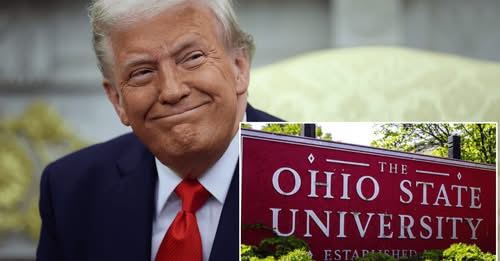
In a dramatic legal battle, an Ohio State University (OSU) student filed a lawsuit against former President Donald Trump, members of his administration, and other federal leaders after his visa was abruptly revoked. The case sparked intense debates about immigration policy, the rights of international students in the U.S., and the power of the federal government to impose restrictions on foreign nationals. At the heart of the lawsuit was an OSU student whose life and academic future were upended by a decision made by U.S. authorities that he argued was both unlawful and unjust.
This essay explores the background of the lawsuit, the broader context of the Trump administration’s immigration policies, the legal arguments presented by the student, and the implications of such a case for the future of international students in the U.S.
Background: The Student’s Visa Revocation
The case began when an OSU student, identified in court documents as an international student on an F-1 visa, had his visa revoked without clear justification. The F-1 visa is a non-immigrant visa granted to foreign students who are attending a U.S. academic institution. It is one of the most common visas used by international students to pursue higher education in the United States.
According to the student’s legal team, the revocation of his visa came after a series of policies and actions enacted by the Trump administration that aimed to tighten immigration controls and reduce the number of international students entering the U.S. These policies were part of broader efforts by the Trump administration to curb immigration and prioritize American citizens in the labor market. Under this environment, international students—particularly those from countries deemed less favorable by the administration—became increasingly vulnerable to visa scrutiny and revocation.
The student in question had completed his studies at OSU and was in the process of securing an optional practical training (OPT) opportunity, which is a program that allows international students to work in the U.S. for a limited time after graduation. This program is crucial for many students, as it provides them with the opportunity to gain work experience in their field of study and helps them establish professional connections in the U.S.
However, before he could take full advantage of this opportunity, the student received a notice that his visa had been revoked. The notification was brief and did not provide a clear explanation for why the decision was made. The student, who had been following all legal and procedural requirements, found himself suddenly without legal status to remain in the U.S. His academic career, professional aspirations, and future in the country were thrown into uncertainty.
The Lawsuit: Legal Arguments and Claims
In response to the revocation of his visa, the OSU student, in collaboration with his legal team, filed a lawsuit against President Trump, the U.S. Department of Homeland Security (DHS), U.S. Immigration and Customs Enforcement (ICE), and other key federal leaders. The lawsuit alleged that the revocation of his visa was arbitrary and violated several constitutional protections, including due process and equal protection under the law.
The Claim of Arbitrary Action
One of the main arguments presented in the lawsuit was that the student’s visa revocation was arbitrary and capricious. Under U.S. law, administrative agencies, including those responsible for immigration enforcement, are required to follow certain procedures and standards when making decisions that impact individuals’ legal status. The student’s legal team argued that the federal government failed to provide any reasonable explanation for the visa revocation, nor did it offer the student an opportunity to contest the decision or present evidence in his defense.
The lawsuit claimed that this lack of transparency violated the student’s right to due process, which is guaranteed under the Fifth Amendment of the U.S. Constitution. Due process requires that the government provide fair procedures before depriving an individual of life, liberty, or property. In this case, the student’s ability to remain in the U.S. and pursue his career were at stake, and the lawsuit contended that the revocation of his visa without explanation or an opportunity for appeal was unconstitutional.
The Argument of Discrimination
In addition to the claim of arbitrary action, the student’s legal team also argued that the revocation of his visa was discriminatory. They pointed to the Trump administration’s broader pattern of policies that disproportionately targeted individuals from specific countries, particularly those in the Middle East, Africa, and Latin America. The student’s lawsuit asserted that these policies had created a climate of fear and uncertainty for international students, who were often subjected to additional scrutiny, arbitrary visa denials, and other hardships.
This argument centered around the notion that the Trump administration’s immigration policies, including the so-called “Muslim Ban” and other restrictions on visa issuance, were grounded in discriminatory motives and were harmful to students from certain regions. The lawsuit claimed that the student was a victim of this broader pattern of discrimination, particularly given the lack of an adequate explanation for the revocation of his visa and the timing of the action.
Violation of International Students’ Rights
The lawsuit also argued that the student’s rights as an international student were violated by the actions of the federal government. International students, while not U.S. citizens, still enjoy certain protections under U.S. law, particularly when it comes to their right to remain in the country while pursuing academic studies. The student’s legal team contended that the revocation of his visa undermined his ability to continue his education and professional development, both of which were critical to his future success.
In addition to his own case, the student’s lawsuit also sought to address the broader implications for international students who could be similarly affected by the Trump administration’s policies. The legal team argued that the federal government’s actions sent a chilling message to international students, discouraging them from pursuing academic opportunities in the U.S. and potentially causing them to reconsider enrolling in American institutions altogether.
The Broader Context: Trump Administration’s Immigration Policies
To fully understand the significance of this lawsuit, it is important to examine the broader context of immigration policies during the Trump administration. Throughout his presidency, Donald Trump prioritized efforts to reduce immigration, with a particular focus on limiting the number of foreign nationals allowed to enter the U.S. He argued that this was necessary to protect American jobs and national security.
These policies included travel bans on individuals from specific countries, restrictions on visa issuance for foreign students, and increased scrutiny of visa applicants. While many of these policies were aimed at reducing illegal immigration and securing U.S. borders, they also had significant effects on legal immigration channels, including student visas.
For international students, the Trump administration’s policies created a climate of uncertainty. In 2020, for example, the U.S. Department of Homeland Security proposed regulations that would have made it more difficult for international students to remain in the U.S. under the F-1 visa program, including requiring students to take a certain number of in-person classes during the COVID-19 pandemic, even as many schools shifted to virtual learning. These policies led to widespread protests from universities and students, who argued that the government was unfairly targeting international students and undermining the educational missions of U.S. institutions.
The lawsuit filed by the OSU student was part of this broader backlash against the administration’s immigration policies. It underscored the precarious position that international students found themselves in under the Trump administration—caught between the desire to pursue their education and career goals in the U.S. and the growing likelihood that they would face obstacles and legal challenges to their status.
Legal Implications and Potential Outcomes
The lawsuit filed by the OSU student raised important legal questions regarding the rights of international students and the authority of the federal government to revoke visas without clear justification. If the case proceeds to court, it could set a significant precedent for future challenges to the Trump administration’s immigration policies, particularly as they relate to international students.
In addition to the legal implications, the case also highlighted the power dynamics between the executive branch and the judiciary in shaping immigration policy. The Trump administration’s aggressive stance on immigration had often been met with legal challenges, many of which sought to rein in executive actions deemed overreaching or unconstitutional. This lawsuit represented another opportunity for the courts to weigh in on the balance of power between the president and the rights of individuals affected by executive policies.
The Future of International Students in the U.S.
The lawsuit filed by the Ohio State University student against President Donald Trump and other federal leaders was more than just a legal battle over one individual’s visa—it was a statement about the broader challenges faced by international students in the U.S. under restrictive immigration policies. The case highlighted the uncertainty that international students experienced during the Trump administration and the legal protections that they are entitled to under U.S. law.
As the legal proceedings unfold, the outcome of the lawsuit could have lasting implications for the future of international students in the U.S. and for the relationship between immigration law and higher education. Regardless of the outcome, this case serves as a reminder of the ongoing tensions between national security concerns, immigration enforcement, and the rights of individuals who seek to further their education in the United States.
The resolution of this lawsuit will likely contribute to the larger conversation about the rights of international students, the role of the U.S. in providing educational opportunities to students from around the world, and the fairness of immigration policies in a rapidly changing global landscape.





